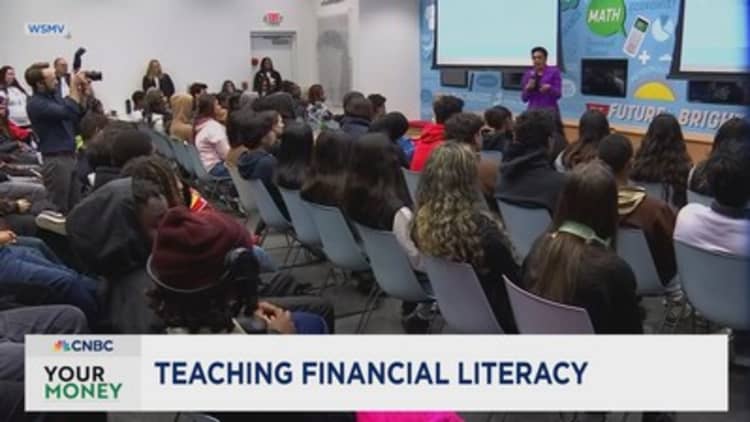CNBC’s senior personal finance correspondent Sharon Epperson speaks with high school students as part of Junior Achievement of Middle Tennessee’s Finance Park financial literacy program.
Sam Wiseman
High schools are increasingly offering real-world financial lessons to students — and soon more than half of U.S. high schoolers will be required to take a personal finance course before graduation.
This week, Pennsylvania became the 25th state to guarantee a personal finance course for high school students. Starting in the fall of 2026, Pennsylvania schools will provide a mandatory course in personal financial literacy for students in the 9th, 10th, 11th, or 12th grades. On Wednesday, Gov. Josh Shapiro signed into law an omnibus bill that included this provision.
“As a result of this legislation, more than half of high school students in the U.S. — 53% — will have guaranteed access to a standalone personal finance course,” said Yanely Espinal, Director of Educational Outreach at Next Gen Personal Finance, a non-profit financial education advocacy organization. Eight states currently guarantee that students will take a personal finance course and 17 states are implementing these policies.
The momentum for financial education in schools has picked up significant steam this year. Eight states have adopted policies in 2023 guaranteeing students will take a personal finance course before graduation.
Earlier this month, Wisconsin Gov. Tony Evers signed a bill that requires high school students to take a personal finance literacy course to graduate, starting with the class of 2028. “We have to make sure our kids have the tools and skills to make smart financial and budgeting decisions to prepare for their future, so ensuring our kids have strong financial literacy is essential to setting them up for success as adults,” Evers said in a press release.
The latest “report card” from the Center for Financial Literacy at Champlain College in Burlington, Vermont, shows seven states — Alabama, Iowa, Mississippi, Missouri, Tennessee, Utah, and Virginia — made the top grade. They earned an “A” because, in those states, high school graduates in the class of 2023 were required to have taken a personal finance course before graduation.
By 2028, when new laws and policy changes are fully implemented, 25 states are projected to earn an “A,” said Pelletier of the Center for Financial Literacy. “Tremendous change is on the horizon. States are rapidly passing laws and changing regulations.”
High school personal finance courses generally teach students real-world lessons about earning income, spending and savings, credit and credit scores, investing, and managing risk, among other topics. These are financial lessons for life.
More from Your Money:
Here’s a look at more stories on how to manage, grow, and protect your money for the years ahead.
‘Not a day will go by that you don’t think about money’
“Once you graduate from high school, not a day will go by that you don’t think about money, how to make it, how to spend it, how to save it. You will be thinking about this until the day you die,” Pelletier said.
Although some schools and school districts have mandated students receive financial education, experts say the recent increase in the number of states that now guarantee high school students will take a financial literacy course before they graduate is partly due to the Covid-19 pandemic, which underscored the financial fragility of many Americans.

“If you leave it up to local control, the districts most likely to unilaterally do this locally, they’re white, and they’re rich. So you would argue the folks that need it the most are the least likely to get it unless the state requires everyone gets it,” Pelletier said.
Studies show personal finance education can make a significant difference in young adults’ financial behaviors, from improving credit scores and lowering loan delinquency rates to reducing payday lending and helping students make better decisions about college loans.
A few states still have ‘virtually no requirements’
Meanwhile, four states — California, Connecticut, Massachusetts, and South Dakota — and Washington, D.C., got failing grades, receiving “Fs in this report because they have “virtually no requirements” for personal finance education in high school. Still, advocates in these “failing” states are working to change the laws to ensure students are guaranteed financial education.
“We are currently collecting signatures in support of financial education for all high schoolers,” said California resident Tim Ranzetta, co-founder of Next Gen Personal Finance. “We are far outpacing our estimates, demonstrating what we all inherently know: that personal finance is an impactful and easy-to-implement course with strong demand from both students, parents and the general public.”
SIGN UP: Money 101 is an 8-week learning course to financial freedom, delivered weekly to your inbox.


